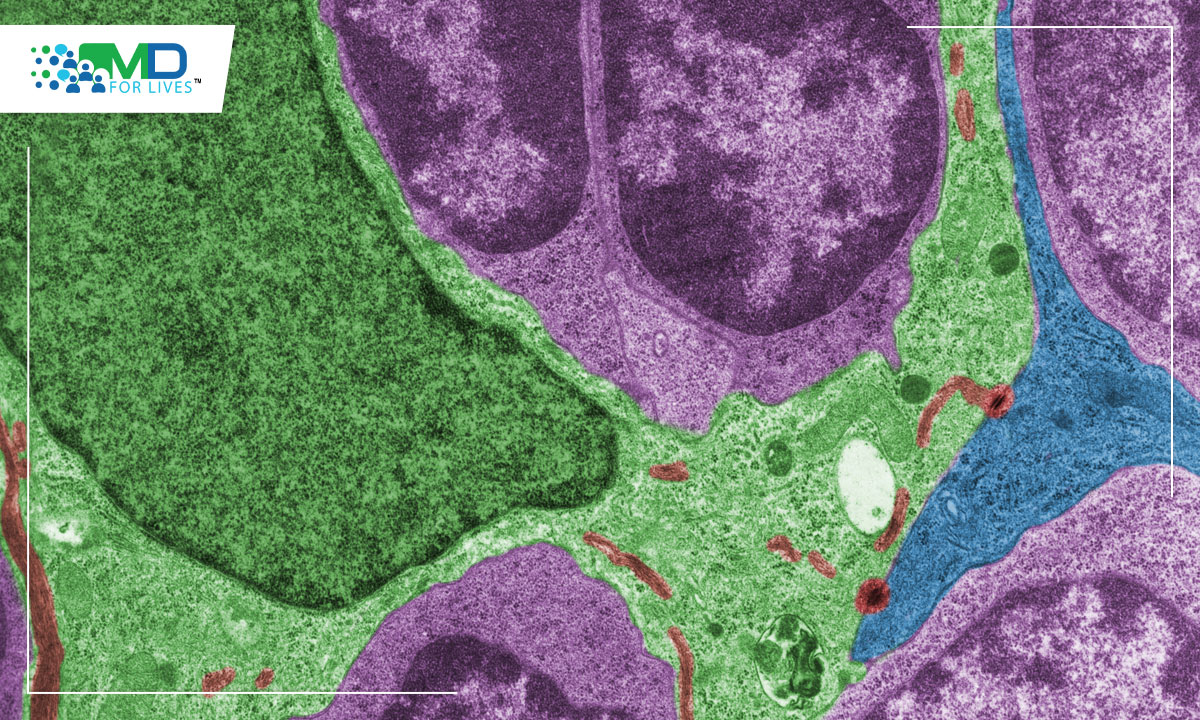Tumor-agnostic treatments have come into prominence as a cutting-edge new method of treating cancer in an era where precision medicine has gained worldwide attention. The first tumor agnostic drug was approved by the American Food and Drug Administration (FDA) in May 2017.
What exactly is Tumor Agnostic Therapy?
Tumor agnostic treatment is a genomically informed treatment strategy that seeks out novel targets regardless of histological origin. This treatment usually meets the following requirements:
- Tumors are enriched for one or more than one molecular changes
- Changes are likely to predict therapy response
- Alterations are found in a wide range of cancers
Role of next-generation sequencing in precision medicine
Precision medicine, which involves designing treatments based on a person’s disease-causing molecular alterations, has benefited from the speed, accuracy, and increasing affordability of next-generation sequencing (NGS). Precision medicine aims to use genomic data to identify the right treatment basis patient profile. Next-generation sequencing technology enables the rapid and accurate sequencing of multiple genes at the same time.
Tsimberidou et al. found that advanced cancer patients who had received sequencing-matched therapy had a higher overall response rate (27% vs. 5%) and longer survival time (median of 13.4 vs. 9.0 months) when compared to patients who did not receive the sequencing-matched therapy.
For patients receiving sequencing-matched therapy versus the ones who are not, additional studies have shown improvements in progression-free survival, overall survival, and tumor response.

Basket Trials
Basket trials have become popular in oncology due to the push for precision medicine and the increasing ease of genetically profiling tumors. In contrast to traditional studies that enroll patients with the same tumor type, basket trials frequently test a drug that targets a specific molecular alteration, regardless of the underlying primary tumor.
To assess the efficacy of the study treatment, patients are grouped into “baskets” that include patients with the same type of cancer such as lung cancer and the same genomic alterationsuch as an NTRK gene fusion. Basket trials are phase II screening studies for the off-label administration of a targeted drug in individuals who have the same genomic alterations for which it has received approval.
Tumor agnostic FDA Approval
Pembrolizumab (KEYTRUDA, Merck & Co.) was granted accelerated tumor agnostic approval by the US Food and Drug Administration on May 23, 2017, for adult and pediatric patients with unresectable or metastatic, microsatellite instability-high (MSI-H) or mismatch repair deficient (dMMR) solid tumors that have progressed following prior treatment and who have no satisfactory alternative treatment options, or with MSI-H or dMMR colorectal cancer that has progressed following treatment with a fluoropyrimidine, oxaliplatin, and irinotecan. This was the FDA’s first tissue/location-independent approval.
Vitrakvi (larotrectinib) has been approved by the European Medicines Agency for the treatment of patients with solid tumors that have an NTRK gene fusion, are locally advanced, metastatic, or for whom surgical resection is likely to be debilitating, and who have no other treatment options.
The FDA approved the combination of dabrafenib (Tafinlar) and trametinib (Mekinist) in June 2022 for patients with metastatic solid tumors with BRAF V600E mutations, making it the fifth therapy to be approved based on a molecular biomarker rather than an anatomical site of tumor origin.
Currently, approved tumor-agnostic drugs include:
- Larotrectinib (Vitrakvi)
- Entrectinib (Rozlytrek)
- Pembrolizumab (Keytruda)
- Dostarlimab (Jemperli)
- Dabrafenib (Tafinlar) and trametinib (Mekinist)
- Selpercatinib (Retevmo)
Treating tumors by rare genetic mutations, not by location
Researchers have found that molecular aberrations can be a target and that these genetic aberrations are present in a variety of tumor types. The first step in the pathway leading to the origin and behavior of most cancers is ultimately caused by rare genetic alterations in molecular mechanisms, such as DNA mutations, translocations, deletions, fusions, and deficient DNA repair mechanisms. As a result of this new information, cancer therapies are shifting from being based on organ-directed therapy to being based on particular genetic alterations.

Rare Genetic Mutations:
Microsatellite instability (MSI)
Microsatellite instability can be caused by germline mutations or by somatic mutations. MSI can also be caused by epigenetic changes that alter microRNA pathways that affect MMR proteins. Immunotherapy has become a treatment option after being approved by the Food and Drug Administration (FDA) for use in tumor-agnostic treatment strategies. Immune checkpoint ligands on tumor cells interact with their immune cell receptors on effector T-cells in a wide range of tumors, inhibiting the immune response that would attack the cancer cell. This interaction is disrupted by checkpoint inhibitors, resulting in an immune cell activation response, which can translate into a potent and long-lasting anti-tumor effect.
RET fusions
Other genetic targets gaining attention include RET fusion mutation, which have shown promising results in lung, thyroid, and pancreatic cancers, among others. In ongoing phase III trials for RET fusion-positive cancer, two medications, LOXO-292 and BLU-667 [4, 13], are being tested.
BRAFv600 deletion
The BRAFv600 genetic mutation has been identified in a variety of solid tumors (including melanoma, NSCLC, and colon cancer) as well as hematologic malignancies such as hairy cell leukemia. In a phase 1 trial, the novel tyrosine kinase inhibitor (TKI) vemurafenib demonstrated encouraging efficacy (81% ORR).
Neurotrophic tyrosine receptor kinase (NTRK) genes
TrkA, TrkB, and TrkC are members of the Trk family of tyrosine protein kinase receptors encoded by neurotrophic tyrosine receptor kinase (NTRK) genes (encoded by NTRK1, NTRK2, and NTRK3, respectably). NTRK gene mutations can also be found in solid tumors as gene translocations or fusion proteins, which cause abnormal cell proliferation. Entrectenib and larotrectenib have an acceptable side effect profile, with toxicities that are unrelated to tumor type, and they are effective regardless of patient age or fusion type.
Challenges of Tumor Agnostic Approvals
The first challenge is to determine whether the same aberrations in different histologies have similar biological, functional, and pathological significance at the target and biology levels. Preclinical and clinical data on NTRK fusions clearly confirmed that NTRK fusions are the single dominant oncogenic driver in fusion-positive cancers, regardless of tissue origin. As a result, NTRK fusions are an ideal tissue-agnostic target. On the other hand, one of the early failures of tissue-agnostic exploration involved BRAF targeting various tumors such as melanoma, thyroid carcinoma, and colorectal cancer. Although vemurafenib was effective in BRAF V600E melanoma and thyroid carcinomas, it was ineffective in colorectal cancer patients with the same BRAF mutation, possibly due to tissue-specific feedback activation of the EGFR pathway. This exemplifies how histological context influences drug-target response in certain cancers. It is unknown how much influence the tissue context has on oncogenic fusions.
Second, the path to clinical development for tumor agnostics can be difficult. Because response assessment criteria differ depending on tumor type, cross-tumor harmonization would be required. Basket trials have no standard design, especially for very rare and ultra-rare patient populations.
Third, regulatory agencies in various countries and geographic regions, such as the United States/North America, the European Union, Japan, and other Asia-Pacific countries, may accept the tissue-agnostic approach to varying degrees.
Conclusion:
Despite the challenges in oncology, it is expected that tissue-agnostic approvals will expand the therapeutic options available to cancer patients. Compared to how treatment plans have previously been developed, tumor-agnostic treatment represents a new way of thinking about how cancer is treated. In order to determine the most appropriate course of treatment for a patient with cancer, regardless of the location of cancer or how it appears under the microscope, oncology doctors may test the tumor’s genes or other molecular characteristics. Physicians need to be aware of tumor agnostic therapy in the oncology department and the significant shift in oncology treatment approaches.
MDforLives will host a webinar addressing all physicians across the world on “Tumor-agnostic indications in oncology -Where are we now and where are we heading? “to throw light on the new era of oncology on February 23, 2023, 9:00 a.m. EST. Dr. Joyce Habib, USA, MD, Medical Oncology, will be the expert speaker in the webinar.
MDforLives is a global community of healthcare professionals who participate in market research on specialized areas of healthcare with the vision of refining the healthcare industry. MDforLives offers online paid surveys for healthcare professionals.
Key highlights of the Webinar:
- A brief overview of tumor-agnostic drug use in oncology (including basket trials and the advent of NGS)
- Historical overview of FDA approval with tumor-agnostic markers
- Shift with now rare alterations and overview of trials and recent approvals
- Challenges of tumor-agnostic approvals

Register for the exclusive webinar now.
References:
- What Health Execs Need to Know about Tissue-Agnostic Cancer Drug Trials. Managed Healthcare Executive. https://www.managedhealthcareexecutive.com/view/what-health-execs-need-know-about-tissue-agnostic-cancer-drug-trials. Accessed 2/9/2023
- Opportunities and challenges in developing tissue-agnostic anti-cancer drugs. Journal of Cancer Metastasis and Treatment. https://jcmtjournal.com/article/view/3477. Accessed 2/9/2023
- Tumor-agnostic Drugs. American Cancer Society. https://www.cancer.org/treatment/treatments-and-side-effects/treatment-types/tumor-agnostic-drugs.html. Accessed 2/9/2023
- The Role of Histology-Agnostic Drugs in the Treatment of Metastatic Castration-Resistant Prostate Cancer. International Journal of Molecular Sciences. https://www.mdpi.com/1422-0067/23/15/8535. Accessed 2/9/2023
- Tumor-Agnostic Treatment for Cancer: An Expert Perspective. Cancer.Net. https://www.cancer.net/blog/2018-12/tumor-agnostic-treatment-cancer-expert-perspective. Accessed 2/9/2023
- Tumor-Agnostic Treatment for Cancer: When How is Better than Where. NIH. https://pubmed.ncbi.nlm.nih.gov/32307639/. Accessed 2/9/2023
- Tumor-Agnostic Drug Development. ASCO. https://ascopubs.org/doi/10.1200/EDBK_200831. Accessed 2/9/2023
- What is a Tumor Agnostic Therapy? METASTATIC TRIAL TALK. https://metastatictrialtalk.org/research-news/tumor-agnostic-therapy/. Accessed 2/9/2023
- Basket Trials for Intractable Cancer. Frontiers. https://www.frontiersin.org/articles/10.3389/fonc.2019.00229/full. Accessed 2/9/2023

MDForLives is a global healthcare intelligence platform where real-world perspectives are transformed into validated insights. We bring together diverse healthcare experiences to discover, share, and shape the future of healthcare through data-backed understanding.






